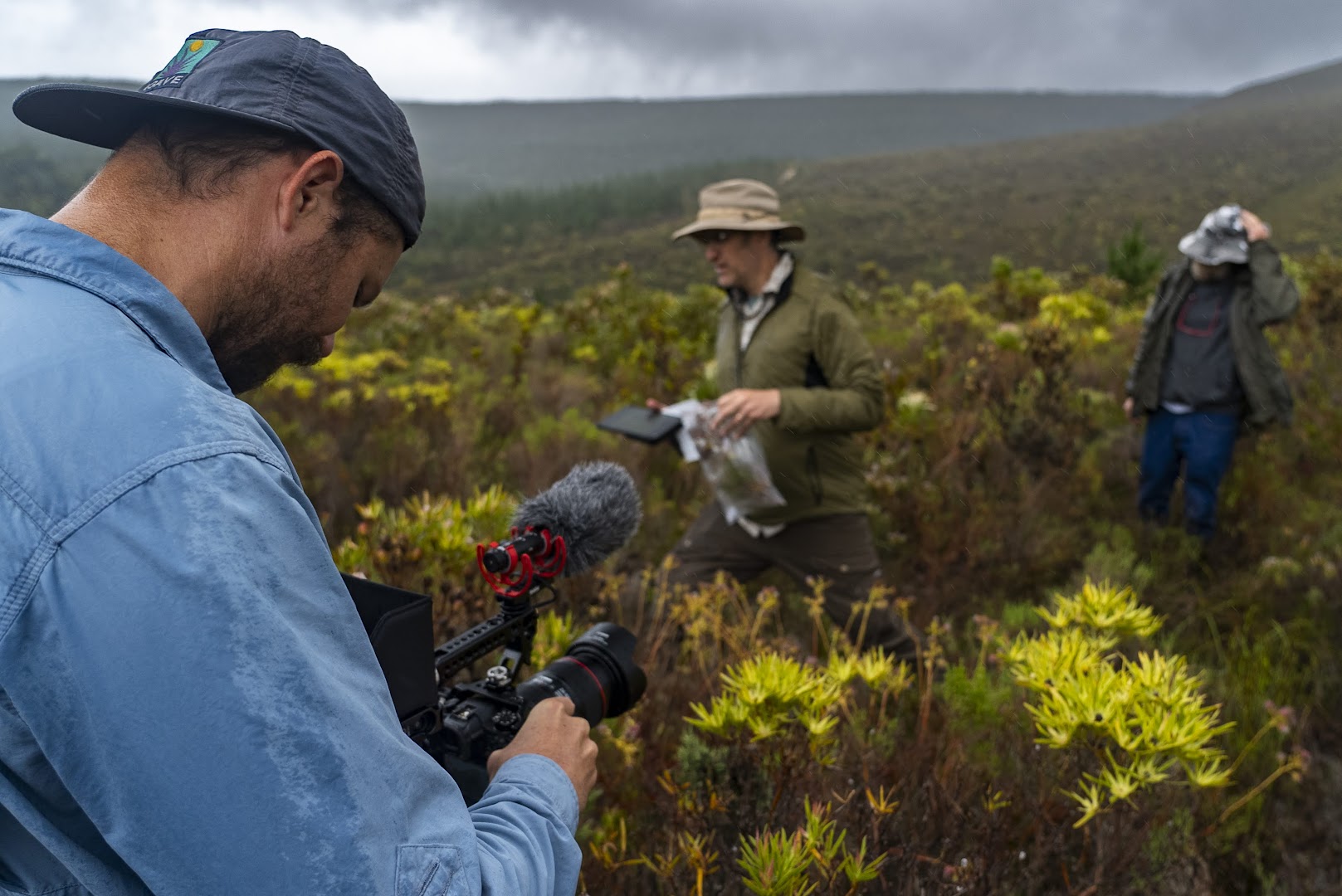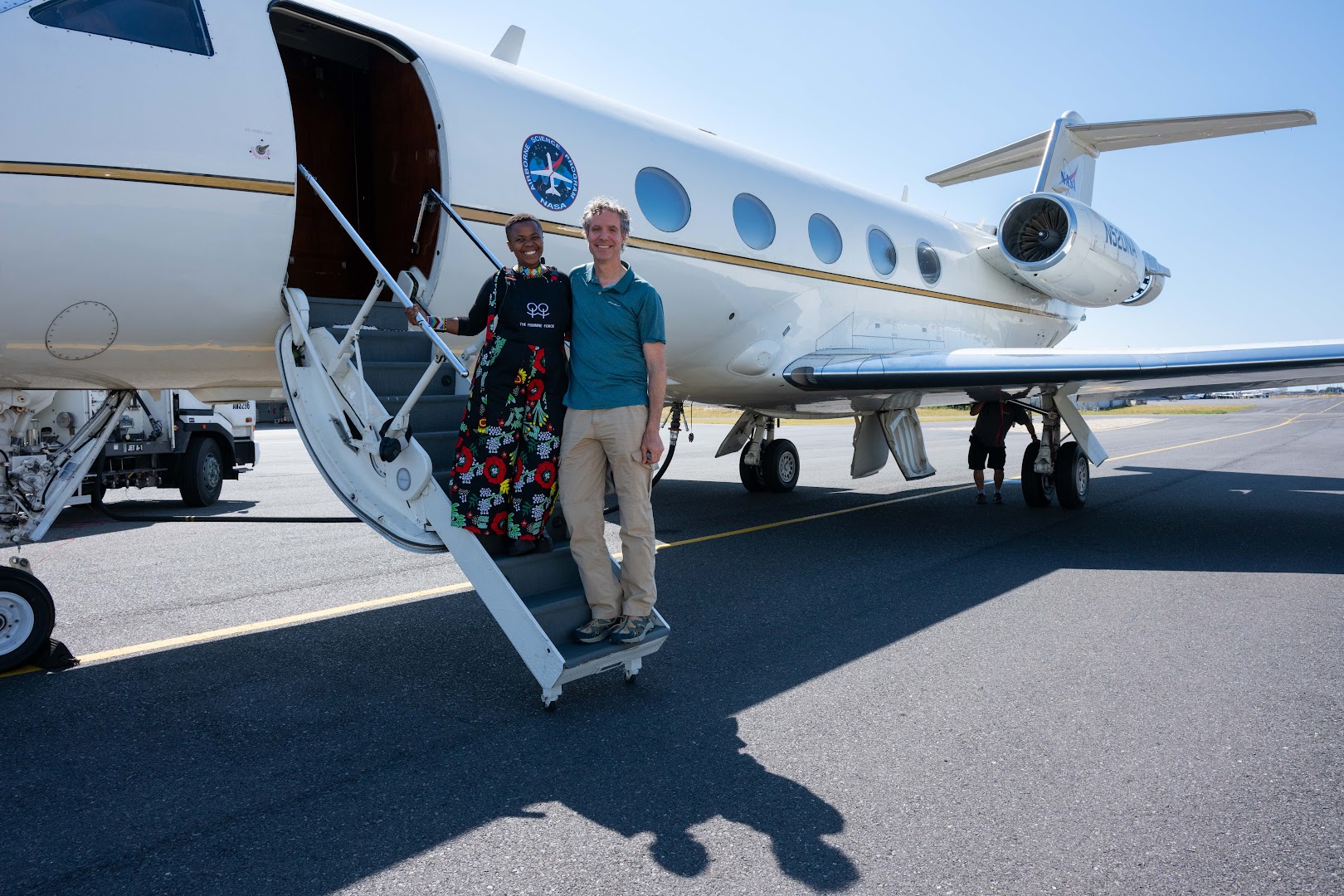UB’s BioSCape Project Earns NASA Award, Featured in Buffalo Film Festival Doc

Multinational research effort mapped South Africa’s biodiversity from the air

Otto Whitehead, co-director of “The Spectrum of Life,” films the BioSCape team conducting field work in South Africa’s Greater Cape Floristic Region. Photo: BioScape
BUFFALO, N.Y. — BioSCape, a multinational research project co-led by the University at Buffalo that monitored Earth’s biodiversity from the air, has received a Group Achievement Award as part of the 2024-25 NASA Honor Awards.
The honor is given to NASA-funded groups that contribute substantially to the agency’s mission, with the BioSCape team credited for “outstanding achievements in advancing the understanding of ecosystem structure, function, and composition and their change over time.”
BioSCape was NASA’s first-ever biodiversity-focused campaign, using a combination of aircraft equipped with remote sensing technology and field work to collect data about South Africa’s Greater Cape Floristic Region, one of the most biodiverse places on the planet.
“The 283 people named on this award represent a wide range of contributions, including students who spent time in the field collecting data, engineers who built the instruments, pilots who spent weeks flying the research lines, professors who designed study components, postdocs who analyzed the observations, and data scientists who processed and archived everything,” says BioSCape’s co-principal investigator Adam Wilson, PhD, associate professor of geography in the UB College of Arts and Sciences. “This award is a wonderful milestone that honors the dedication and persistence of everyone involved.”
Co-led by Erin Hestir of the University of California, Merced, and Jasper Slingsby of the University of Cape Town, the BioSCape team conducted their research throughout 2023.
Two NASA aircraft and one South African aircraft flew missions over the cape to collect ultraviolet, visual, thermal and other images, which can provide insights about everything from the surface temperatures of the sea to the amount of nitrogen in a forest canopy. Meanwhile, scientists gathered additional data on the ground, like recording bird and insect calls and extracting environmental DNA from water samples.
The team is now synthesizing its data and using it to write studies. Since the beginning of the project, the team has published over 40 studies and scientific presentations in various journals. Their airborne data is publicly available online on the NASA website.
“I look forward to the next few years as more results are published and we can start using that information to better understand and conserve our vital ecosystems around the world,” Wilson says.
In addition, the hope is that BioSCape has laid the foundation for monitoring biodiversity from even higher up — that is, from space. Some of the tools used in the project are being employed by NASA to study other planets and stars outside our solar system.
“By gathering this kind of data from a plane, we learn more about how we could do the same thing from satellites,” Wilson says.

Adam Wilson (right), UB associate professor of geography, and the narrator of the documentary, Zolani Mahola, also known as the One Who Sings, stand by one of the aircrafts used in the project. Photo: BioScape
Documentary puts project into broader context
BioSCape is also the subject of a new documentary, “The Spectrum of Life,” which will premiere at the 2025 Buffalo International Film Festival (BIFF) next month.
The 36-minute film was directed by the founders of Fishwater Films, South African ecologists and filmmakers Otto Whitehead and Jeremy Shelton, who accompanied the BioSCape team on the ground and in the air as they conducted their research.
“Otto and Jeremy synthesized our complex science into a compelling narrative. They crafted a much larger and more captivating story about how this project resonates with the human experience and global efforts to understand our place in the universe,” Wilson says. “The film really puts BioSCape in the broader context of the human experience and our connection to the fabric of life.”
Wilson and Whitehead will be in attendance at the premiere, which will take place at 12:30 p.m. on Friday, Oct. 10, at Nork Park Theatre in Buffalo. It will be screened as part of “BIFF Shorts: Climate Stories + Earth Works,” which features films about “how we value, measure, monitor and conserve ecosystems around the world; as well as what’s at stake on a cultural and personal level.”
“This is the perfect venue. It places our scientific work in a broader cultural context, alongside other powerful stories about conservation and ecological knowledge,” Wilson said. “Plus, having the premiere in Buffalo is especially meaningful. We are excited to engage with the local community and share the global importance of the BioSCape project right here at home.”









